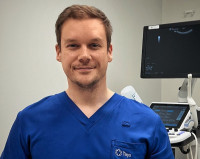Liquid Biopsies: A Promising Method for Detecting and Monitoring Cancer

In the future, liquid biopsies could become a crucial part of cancer diagnosis, surveillance, and screening. These tests might replace or complement traditional methods and help in earlier detection of cancer recurrence and the initiation of treatments, resulting in better treatment outcomes.
The diagnosis and monitoring of many cancers have long been based on computed tomography, which uses ionizing radiation, in addition to tissue biopsies. This "slice imaging" has been used in the absence of reliable biomarkers. In addition, various invasive examinations such as endoscopic procedures are often performed.
“Liquid biopsies refer to the use of bodily fluids, such as blood and urine, as a cancer sample. These tests may allow for the study of tumor DNA, mutations, or epigenetic changes from the cancer tumor or its metastases. Liquid biopsies have enabled detecting cancer recurrence several months earlier than imaging studies in many cancer types. These methods are becoming ever better and more reliable. In the future, treatment could be started earlier and at best at a stage when no changes are yet visible in imaging. Gene sequencing, which has become significantly cheaper in recent years, has made liquid biopsy an even more reasonable method of analysis,” says Jussi Nikkola, MD, PhDand urology specialist.
The Instrumentarium Science Foundation has awarded Nikkola a grant of 25,000 € per year, which will enable him to travel to Vancouver for two years and participate in international cancer research projects along with several other urologists and researchers.
Benefits for the patient
Diagnostics based on liquid biopsies can be considered a safe, minimally invasive, and easy method for the patient.
"We are particularly interested in urologic cancers, for which there are no practical biomarkers. These include cancers of the urinary tract, kidney or penile cancer, as well as soft tissue sarcomas. Monitoring these is often burdensome for patients, as the procedure is based on different imaging methods that patients have to come in specifically for," says Nikkola.
According to Nikkola, liquid biopsy is much more comfortable for the patient and, thanks to advanced research, probably also a more accurate and sensitive method of examination than imaging.
"I hope that the use of liquid biopsy can be expanded further for clinical use, starting with comparative research plans, of course. For patients, it would be convenient if, for example, cystoscopies could be partially replaced by a urine sample taken at home," says Nikkola.
Liquid biopsies for cancer screening
Liquid biopsies can also be used for cancer screening in larger groups of people, allowing them to take urine samples at home, for instance.
This screening method is currently being employed in a study led by Nikkola, along with professors Jukka-Pekka Mecklin and Toni Seppälä who run the Finnish Lynch syndrome registry, for persons diagnosed with an inherited cancer predisposition syndrome called Lynch syndrome. People with Lynch syndrome are at a significantly higher risk of developing different abdominal cancers and also urinary tract cancers than the general population.
"To date, it has not been possible to offer any kind of screening for the detection of urinary tract cancers, as traditional screening methods have been too insensitive. But with the use of a user-friendly pre-packaged kit, individuals can easily provide a liquid biopsy urine sample to the research facility from the comfort of their own home. This method ensures the safe collection of a large number of samples even during situations such as the pandemic," Nikkola points out.
Personalized cancer treatment
Nikkola is passionate about the potential for personalized cancer treatment. Just as people are unique, so are cancerous tumors and individuals' immunological abilities. Finding the best treatment approach for each patient's specific cancer is essential for both the patient and society.
"By utilizing patient-specific panels created from tumor cancer mutations, liquid biopsy methods can provide more detailed information about a patient's cancer. This information could be used to guide a patient's follow-up and treatment in the future. The genome-level information obtained from samples allows for better targeting of treatments and precision treatment of cancer," explains Nikkola.
Insights and innovative solutions from Vancouver
In addition to the Instrumentarium Science Foundation grant, Nikkola has secured funding for his research in Vancouver from the Sigrid Juselius Foundation. Nikkola and his family will be moving to Vancouver for two years to continue his current research and participate in new research projects alongside an international team of researchers. Nikkola's research focuses on urological cancers, particularly urinary tract cancers.
"It is encouraging to see how much research on urological cancers has attracted funding in Finland and around the world. Without this funding, participating in this exciting research collaboration would be very challenging. I will bring the projects started in Finland and my expertise with me to Canada, and I will return to Finland with new skills, knowledge, and practices."
Text: Kai Tarkka / Viestintäpalvelu Taika Oy
Image: Jussi Nikkola
